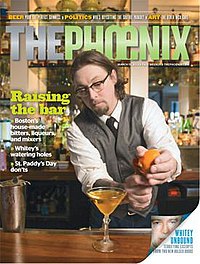The Boston Phoenix

The cover of the March 15, 2013 Boston edition of The Phoenix, the magazine's last
|
|
| Type | Alternative weekly |
|---|---|
| Format |
Tabloid (Portland and Providence editions) Magazine (Boston edition) |
| Owner(s) |
Phoenix Media/Communications Group (Boston and Providence editions) |
| Publisher | Stephen M. Mindich |
| Editor | Peter Kadzis |
| Founded | 1966 |
| Ceased publication | 2013 (Boston Phoenix) 2014 (Providence Phoenix) |
| Headquarters |
126 Brookline Ave. Boston, MA 02215 United States |
| Website |
ThePhoenix.com (Boston and Providence) PortlandPhoenix.me (Portland) |
Phoenix Media/Communications Group (Boston and Providence editions)
The Phoenix (stylized as The Phœnix) is the name of several alternative weekly periodicals published in the United States of America by Phoenix Media/Communications Group of Boston, Massachusetts, including the Portland Phoenix and the now-defunct Boston Phoenix, Providence Phoenix and Worcester Phoenix. These publications emphasize local arts and entertainment coverage as well as lifestyle and political coverage.
The papers are somewhat similar in format and editorial content to the Village Voice.
The Phoenix was founded in 1965 by Joe Hanlon, a former editor at MIT's student newspaper, The Tech. Since many Boston-area college newspapers were printed at the same printing firm, Hanlon's idea was to do a four-page single-sheet insert with arts coverage and ads. He began with the Harvard Business School's newspaper The Harbus News. A student there, James T. Lewis, became Hanlon's advertising manager.
Boston After Dark began March 2, 1966. Theater enthusiast Larry Stark began contributing theater reviews with the second issue. When the insert idea did not pan out, the trio continued Boston After Dark as a weekly free paper.
A year after the launch, Hanlon sold off his half to Lewis. For three years, Boston After Dark kept the four-page format, with Lewis as publisher, Jane Steidemann as editor, Stephen M. Mindich as ad salesman and Stark as full-time theater critic and copy editor, plus film reviews by Deac Rossell, who later went on to become head of programming at London's National Film Theatre.
...
Wikipedia
